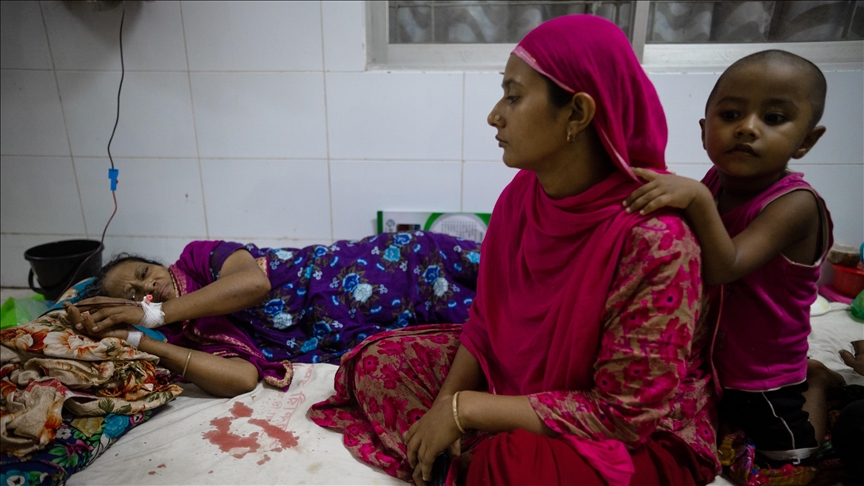Dengue cases in Bangladesh 5 times higher than reported numbers: Medics
Bangladesh reports over 900 deaths, 180,000 hospitalizations due to dengue fever this year
 Dengue infected people are under treatment at the Sher-e-Bangla Medical College Hospital in Barishal, Bangladesh on August 18, 2023. ( Niamul Rifat - Anadolu Agency )
Dengue infected people are under treatment at the Sher-e-Bangla Medical College Hospital in Barishal, Bangladesh on August 18, 2023. ( Niamul Rifat - Anadolu Agency )
DHAKA, Bangladesh
Bangladesh needs to improve its primary and secondary healthcare facilities as the country is struggling to deal with a steadily rising number of dengue cases, which total up to five times higher than the figures reported by the government, medics told Anadolu.
The high number of reported cases has already put additional pressure on the country’s health systems.
In addition, amid a lack of preparedness and facilities in hospitals in other districts and towns, patients from across the country continue to seek treatment at hospitals in the capital, Dhaka.
The influx of patients forced the government to issue an order last week asking hospitals in other parts of the country not to send patients to the city.
Bangladesh has reported 928 deaths from dengue fever since January, with the number of people hospitalized totaling 180,000 -- the highest numbers in 23 years.
Thirty-four-year-old Mobassher Hossain was among the many people who had traveled to a hospital in Dhaka’s Uttar Badda neighborhood so his four-day-old daughter could undergo a blood test.
Speaking to Anadolu, he said he and his mother took the baby to the hospital as his wife had been admitted at another private hospital after testing positive for dengue three days after giving birth.
“Now our doctor suggested a blood test for my four-day-old girl as she experienced a rise in body temperature. The past few days have been a nightmare for my family. I hardly accept taking blood from my baby,” Mobassher added.
Government and private hospitals in Dhaka have become overwhelmed as patients have been rushing there for treatment, experiencing a rise in body temperature, aching and vomiting.
Bangladesh has reported all four dengue serotypes -- DENV-1, DENV-2, DENV-3 and DENV-4. The World Health Organization (WHO) says there is no specific treatment for dengue but the timely detection of cases can help avoid fatalities.
Dengue appears to coincide with the rainy season from May to September and higher temperatures, while the WHO said Bangladesh’s climate conditions are becoming more favorable for the transmission of dengue.
Cases 'higher than reported'
Dr. Shahadat Hossain of the government’s Directorate General of Health Services (DGHS) told Anadolu that a recent survey they conducted showed the reported cases of dengue could be four to five times higher than government data.
“But the unreported number of the deaths would not be that much. A rough 20% more deaths may be unreported. We reported cases after being admitted to hospitals, but there are some cases that go unreported in the community,” he added.
Meanwhile, more than half of the new cases are from outside Dhaka, which is a new concern, said health professionals.
“Cases are now stable in Dhaka but steadily increasing in other districts. We need to have greater coordination with the local health authorities and municipalities. We take decisions, but we need strong monitoring in the field,” Dr. Shahadat emphasized.
He said dengue fever was largely Dhaka-centric, but for the last two years they have seen dengue outbreaks in all other districts and even in rural areas.
Need for equipped healthcare service
Bangladesh’s healthcare system has limited capacity and skilled health staffers to deal with the outbreak at the district level.
Health experts have suggested that strengthening the capacity and intervention of the municipalities across the country is needed to bring down dengue fever. The dengue situation will only improve now if cases outside Dhaka are brought under control.
Renowned Bangladeshi public health physician Dr. Abu Jamil Faisel blamed the coordination gaps between the government agencies and improper action by the government despite repeated warnings by health specialists and entomologists.
The health authority often sprays anti-mosquito fog but they don’t review it regularly with experts, including entomologists, to determine whether it is effective in killing dengue mosquitoes.
“If we run an improper campaign, then millions of dollars won’t bring any improvement in the ever-worsening dengue crisis,” he warned.
The World Bank in August approved a $200 million loan, including to improve primary healthcare services and the dengue situation in Bangladesh. The Health Ministry said it spent on average 50,000 Taka ($452) on each patient in government hospitals.
Virologist and public health expert Dr. Mohammad Mushtuq Husain told Anadolu that Bangladesh needs to improve and reform its healthcare system.
“We need to improve the primary and secondary healthcare services. Hospitals in all districts, towns and rural areas need to have necessary services, testing. If a patient gets early testing of dengue, then we can avoid possible death due to dengue fever or other diseases, and the patient will not rush to Dhaka,” he said.
However, he said he feared that the dengue situation would not improve until the monsoon rains ended, saying that the situation may prevail until October as intermittent rains would further exacerbate the outbreak.








